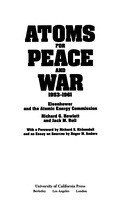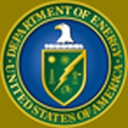Explore

Atoms for Peace and War, 1953-1961
Richard G. Hewlett and Jack M. Holl
1989-2021
This book begins with a surreptitious briefing of Dwight D. Eisenhower on the status of nuclear technology in the United States a few days after his election as President in 1952. So secret was the occasion that only Eisenhower himself and two government officials knew at the time that the meeting had taken place, much less what was revealed. Some of the infor- mation conveyed was considered too sensitive to be committed to paper, and the official who spoke with the President-elect destroyed all his notes as soon as he left the room.
The book ends in autumn 1960, just eight years later, as Eisenhower was completing his second term. By that time he had become a central figure in a growing national and international debate on the terrifying issues that could lead to nuclear war or world peace. The place of nuclear power in the world economy and in military strategy was no longer the concern of a few thousand scientists, engineers, and government officials living in se- cret conclaves sealed off from the rest of the world by elaborate security barriers. Nuclear technology had now become a part of the political, the economic, and even the social fabric of the United States and the industri- alized nations of the West.
How this remarkable change occurred in less than a decade is a question that historians have only begun to probe, and when they do they will find it a subject of extraordinary complexity and interest. As one would ex- pect, some aspects of the emergence of nuclear technology are recorded in the conventional records of national and international politics. But for an adequate understanding of the subject, historians must also dig into complex issues of economic policy, including the role of national govern- ments and private industry in developing nuclear and conventional power sources, the changing prospects of economic use of nuclear power in dif- ferent parts of the world, and the impact of technological development on these prospects.
Why read this book? Have your say.
You must be logged in to comment.
Rights Information
Are you the author or publisher of this work? If so, you can claim it as yours by registering as an Unglue.it rights holder.Downloads
- 304 - pdf (PD-US) at Unglue.it.
Keywords
- Government policy
- History
- Nuclear energy
- U.S. Atomic Energy Commission
Links
web: https://www.energy.gov/management/downloads/hewlett-and-holl-atoms-peace-and-warEditions


